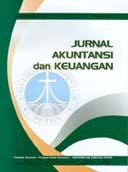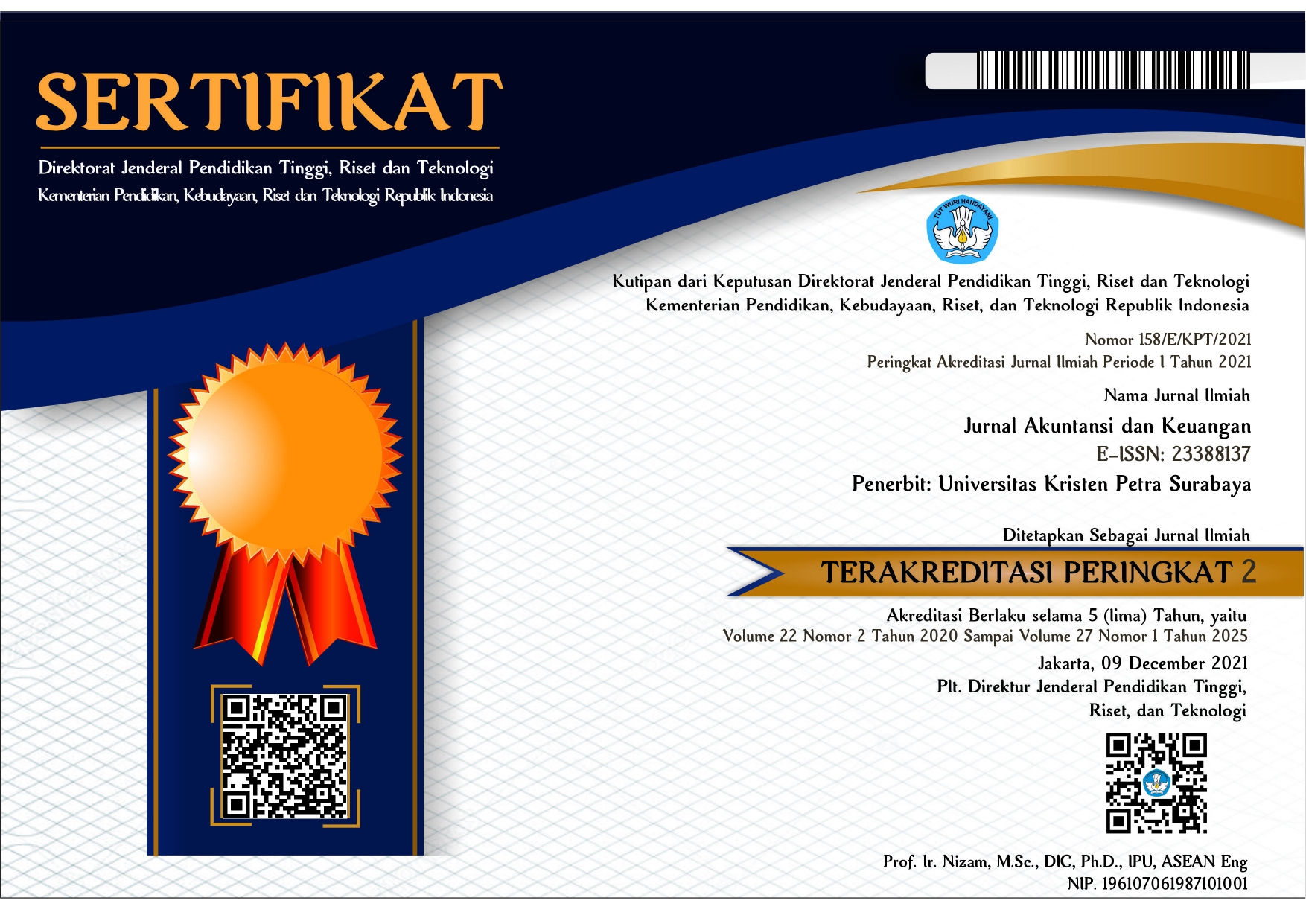The Dualism of Tax Consultants’ Roles in the Taxation System
DOI:
https://doi.org/10.9744/jak.21.1.30-37Keywords:
Tax consultant, taxpayer, self-assessmentAbstract
The dualism of tax consultant's role as the agent of taxpayers and governments becomes a phenomenon in this research. Therefore, this research aims to understand the meaning of the dualism role of tax consultants in the taxation system. This study uses a qualitative approach to interpretive methods. The interpretive method assumes that reality does not stand alone but is constructed by the research subject. The method of data collection is done by interviewing two taxpayers and three tax consultants. The data analysis focused on the sentences and phrases that directly allude the researched phenomenon. The result of the research tells that there is an effort to balance the dualism of the role so that tax consultants can still protect the taxpayer’s interests, while ensuring that their services do not harm the nation. The balance of the dualism of the role is reflected into four meanings, namely: taxpayer advisors, mediators of taxpayer and government conflicts, aligning taxpayer and government relations and controlling taxpayer complianceReferences
Andon, P., Free, C. and Scard, B. (2015). Pathways to accountant fraud: Australian evidence and analysis. Accounting Research Journal, 28(1), 10-44.
Azwar, S., Sikap Manusia, Teori dan Peng-ukurannya, Pustaka Pelajar., Yogyakarta, 1995.
Beck, P.J., J.S. David, and W.-O. Jung. 1991. Experimental Evidence on Taxpayer Reporting under Uncertainty. The Accounting Review, 66(3), 535-558.
Bobek, D. D., Hageman, A. M. and Hatfield, R. C. (2010). The role of client advocacy in the development of tax professionals’ advice. Journal of the American Taxation Association, 32(1), 25-51.
Carley, K.M. and D.T. Maxwell., Understanding Taxpayer Behavior and Assessing Potential IRS Interventions Using Multiagent Dynamic-Network Simulation. Proceedings of the 2006 Internal Revenue Service Research Conference, Washington, DC, 2006, 93-106.
Cox, S.R. and R.R. Radtke. 2015. The Effects of Multiple Accountability Pressure on Tax Return Preparation Decision. Advances in Taxation, 12, 35-50.
Daymon, C. and I. Holloway., Metode-Metode Riset Kualitatif dalam Public Relations dan Marketing Communication, Bentang., Yogyakar-ta, 2008.
Devos, K. (2012). The impact of tax professionals upon the compliance behaviour of Australian individual taxpayers. Revenue Law Journal, 22(1), 31.
Fogarty, T. and A. Jones, D. 2014. Between a rock and a hard place: How tax practitioners straddle client advocacy and professional responsibilities. Qualitative Research in Accounting & Management, 11(4), 286-316.
Gupta, R. (2015). Relational impact of tax practitioners’ behavioural interaction and service satisfaction: Evidence from New Zealand. eJournal of Tax Research, 13(1), 76-107.
Gutman, H.L. 2012. The Role of the Tax Advisor in the Changing World of Global Tax Administration: The 2012 Erwin N. Griswold Lecture Before the American College of Tax Counsel, The Tax Lawyer, 65(3), 461-476.
Hageman, A.M. and D.G. Fisher. 2016. The Influence of Client Attributes and Organizational Climate on Tax Professionals. Research on Professional Responsibility and Ethics in Accounting, 20, 31-66.
Holtzman, Y. (2007). Challenges in achieving transparency, simplicity and administering of the United States tax code. Journal of management development, 26(5), 418-427.
Isa, K. (2014). Tax complexities in the Malaysian corporate tax system: minimise to maximise. International Journal of Law and Manage-ment, 56(1), 50-65.
Kaplow, L. (1998). Accuracy, Complexity, and the Income Tax. The Journal of Law, Economics, and Organization, 14(1), 61-83.
Killian, S. and Doyle, E. (2004). Tax aggression among tax professionals: the case of South Africa. Journal of Accounting, Ethics and Public Policy, 4(3), 159-189.
Klepper, S., Mazur, M. and Nagin, D. (1991). Expert intermediaries and legal compliance: The case of tax preparers. The Journal of Law and Economics, 34(1), 205-229.
Kwon, M.M. 2014. Dysfuction Junction: Reasonable Cause and Good Faith Reliance on Tax Advisor with Conflict Interest., The Tax Lawyer, 67(3), 403-450.
Larin, G. N., Duong, R. and Jacques, M. (2008). Policy Forum: Responses to Aggressive Tax Planning—A Study Framework. Canadian Tax Journal, 56(1), 143-159.
Martins, A. (2013). Complexity in the tax law and reported earnings: cost deduction in the Portuguese fiscal system. Journal of Financial Reporting & Accounting, 11(2), 166-178.
Mitu, N. E. 2016. Taxpayer behaviour: typologies and influence factors. Revista de Științe Politice. Revue des Sciences Politiques (49), 77-87.
Mulligan, E. and L. Oats. 2016. Tax and Per-formance Measurement: An Inside Story., Advances in Taxation, 23, 59-85.
Murphy, K. and Y. Sakurai., Aggressive Tax Planning: Diffrentiating Those Playing The Game From Those Who Don't T, Centre for Tax System Integrity, Research School of Social [22]Sciences, Australian National University Australia, 2001.
Niemirowski, P. and Wearing, A. J. (2003). Taxation agents and taxpayer compliance. Journal of Australian Taxation, 6(2), 166.
Nienaber, S. G. 2010. Factors that could influence the ethical behaviour of tax professionals. Meditari Accountancy Research, 18(1), 33-46.
Nkundabanyanga, S. K., Mvura, P., Nyamuyonjo, D., Opiso, J. and Nakabuye, Z. (2017). Tax compliance in a developing country: Under-standing taxpayers’ compliance decision by their perceptions. Journal of Economic Studies, 44(6), 931-957.
OECD. 2007. The Enhanced Relationship, Working Paper 6, OECD Tax Intermediaries Study, 1-31.
OECD., Study into The Role of Tax Intermedia-ries, 2008.
Owens, J. 2012. Tax Administrators, Taxpayers and Their Advisors: Can the Dynamics of the Relationship Be Changed, Bulletin For International Taxation, 516-518.
Pickhardt, M. and Prinz, A. (2014). Behavioral dynamics of tax evasion–A survey. Journal of Economic Psychology, 40, 1-19.
Pui Yee, C., Moorthy, K. and Choo Keng Soon, W. (2017). Taxpayers’ perceptions on tax evasion behaviour: an empirical study in Malaysia. International Journal of Law and Management, 59(3), 413-429.
Sakurai, Y. and V. Braithwaite. 2001. Taxpayers' Perception of The Ideal Tax Adviser: Playing Safe or Saving Dollars Working Paper, 5, 1-32.
Somantri, G.R. 2005. Memahami Metode Kualitatif, Makara, Sosial Humaniora., 9(2), 57-65.
Stephenson, T., G. Fleischman, and M. Peterson. 2017. Demand for Tax Preparation Services: An Exploratory Examination of Client Versus Tax-Preparer Expectation Gaps. Advances in Taxation, 24, 199-231.
Tan, L.M., Types of Advice from Taxpayers: A Preliminary Examination of Taxpayers's Prefe-rence, Discussion Paper Series, Department of Accountancy and Business Law, Massey University Palmerston North, 1998, 4-29.
Thuronyi, V. and I. Espejo., How Can Excessive Volume of Tax Disputes Be Dealt With? Legal Department IMF, 2013, 1-63.
Tomasic, R. and B. Pentony. 1990. Defining Acceptable Tax Conduct: The Role of Professional Advisers in Tax Compliance, Criminology Research Council, 1-63.
Waples, E. and Darayseh, M. (2009). Ethics and Tax Education: A Change in Focus Is Needed. American Journal of Business Education, 2(6), 1-6.
Wolfman, B. and J.P. Holden. 1982. Ethical Problems in Federal Tax Practice. Harvard Law Review, 95(8), 1995-2009.
Wuisman, J.J.J.M, Teori dan Praktek: Memper-oleh Kembali Kenyataan Supaya Memperoleh Masa Depan, Yayasan Pusaka Obor., Jakarta, 2012.
Downloads
Published
How to Cite
Issue
Section
License
Authors who publish with this journal agree to the following terms:
- Authors retain the copyright and publishing right, and grant the journal right of first publication with the work simultaneously licensed under a Creative Commons Attribution License that allows others to share the work with an acknowledgement of the work's authorship and initial publication in this journal.
- Authors are able to enter into separate, additional contractual arrangements for the non-exclusive distribution of the journal's published version of the work (e.g., post it to an institutional repository or publish it in a book), with an acknowledgement of its initial publication in this journal.
- Authors are permitted and encouraged to post their work online (e.g., in institutional repositories or on their website) followingthe publication of the article, as it can lead to productive exchanges, as well as earlier and greater citation of published work (See The Effect of Open Access).<a href="http://creativecommons.org/lice















